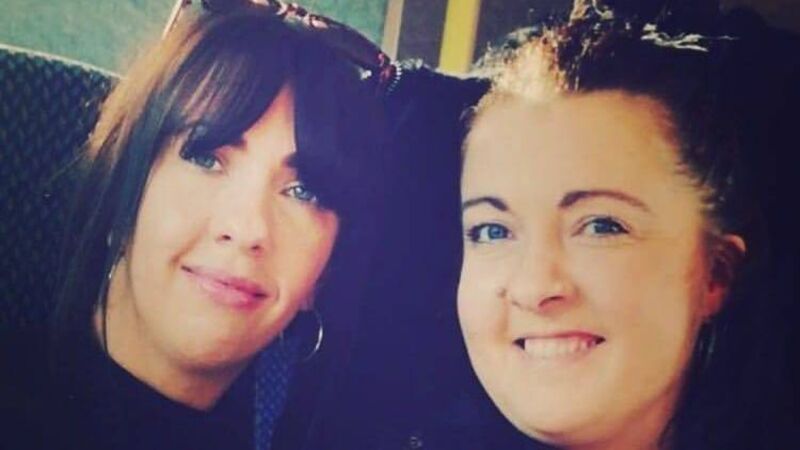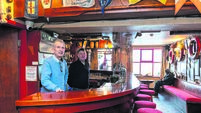We want to ensure no other family suffers like ours

Tracey Corcoran with her sister Sinead. Tracey grew up in Ballyphehane, but moved to Togher.
THIS month would have marked Tracey Corcoran’s 40th birthday, had she not died from Sepsis at the age of 37 on June 20, 2020.
The Irish Sepsis Foundation is hosting a fundraising event on March 11 at The Address Hotel, Cork.
The Foundation was founded last September by barrister Doireann O’Mahony, who has come across the devastating effect of sepsis through her legal work, and Stephen Carr, whose mother died from the condition in 2018.
Tracey’s brother, James, now a member of the board of the foundation, along with his sister Sinéad and wife Lorraine, wishes to both commemorate his beloved sister and raise awareness of the cruel disease.
“Tracey was a wonderful, committed, devoted mother to her daughter Sophie (16) and son William (13). It’s lovely now to see her personality developing in each of them. They are such kind and respectful children. She’d be very proud of them,” says James.
James describes his big sister as the glue that kept his family of six together. If there were ever rumblings of a fight, he says, Tracey would have been the first to crack a joke to break the tension. She loved to make people laugh, was kind and caring and bubbly.
Tracey spent her whole life making sure other people were alright. This was certainly true when it came to her little brother James, of whom she was very protective, especially when he experienced bullying as a young boy.
“She just took an interest in everyone. She had so many good friends who loved her. She was wise beyond her years, understanding what was most important in life from an early age, attending bingo with her nan before she died, making things better and more enjoyable for everyone.
“She wanted to do whatever she could to help other people even when she had her own troubles. Tracey had a very rare form of rheumatoid arthritis, adult-onset Still’s disease, also known as AOSD, which caused her to have two hip replacements and two knee replacements during her short life,” James adds.
He speaks candidly about Tracey’s death and the devastating effect it had on his family. Covid made her death even more unbearable. James remembers relying on phone calls from the hospital. She seemed to get better and was moved from ICU into a normal ward. She was sitting up and showing signs of being well, but then she went rapidly downhill.
James explains that sepsis can often ape other conditions, making it hard to catch in time. The fact that she seemed to recover before deteriorating made it extremely difficult for the close-knit family and their community of family and friends.
“She hung on for a long time because she was a warrior but when the hospital said we could come in, we knew she was going to die. It was a good thing that the children got a chance to say goodbye to her.
“When we lost Tracey, we felt very alone. We want to raise funds for the Irish Sepsis Foundation to set up support groups in community centres with volunteers to guide and support other families.”

The Corcoran family originally hails from Hillview Estate in Ballyphehane. Tracey had moved to Togher and her local church there saw a huge turn-out for her funeral, James recalls.
“Honestly, it was all a blur. I remember all the people turning up outside the church and the guards of honour of players from Pearse Celtic football club and the Barrs Hurling club. Tracey spent so much time supporting her children. She was devoted to her community, giving children lifts to games and shows, fundraising, all that stuff.
“Her fortieth birthday is on March 2 so we see this fundraising event in The Address on March 11 as a wonderful way to mark it, to remember her as she was, all that she did for us as a family and for everyone else. We plan to have a drink reception, followed by a slideshow, a doctor’s talk on sepsis and a raffle with spot prizes, including a €800 holiday voucher with Budget Travel.”

James also sees it as a nice opportunity to say thank you to businesses who have supported their work (Oxford Global Resources, Novus Diagnostics, Satellite Taxis, Ez Living, Ferrero Rocher, OML Ventilation). The doctor’s talk is important; they are driven by a passion to inform people about sepsis, to protect other families from what his family has had to endure.
“I’ll be honest with you and say I didn’t know anything about sepsis when we lost Tracey. It’s hard not to think that if we’d known more, we could have helped her, caught it in time, but none of us had a clue. That’s why we are doing the work we are doing.
“We want to ensure that no family has to suffer as we have had to suffer.”
According to research, to which James refers, only 27% of Irish people know anything about the life-threatening condition. One of James’ roles is to share information via social media. He says a woman approached him at a wedding recently to say she had caught a friend’s sepsis in time, thanks to the foundation’s awareness-raising work.
Facing in to life without Tracey, such stories mean a great deal to James.
His sister Sinéad has taken over the role of looking after Tracey’s son and daughter.
“She works a 12-hour shift through the night and is up then to bring the children to school, and collects them, Sinead really shares a great bond with both of them and I really admire what she is doing. I try to help as much as I can as does my other brother, Thomas. It’s funny, if we’re ever a bit snappy with one another I think to myself, this is where Tracey would have made it better, kept us all together. She did all the hard work of looking after people.”
James says that his parents still find it very hard.
“Nobody can understand it until it happens to them. The truth is that nobody should ever have to bury their child. My parents love that we are doing this work in Tracey’s name. We want her to have a legacy. We want that for her beautiful children.
“I’m happy to put my emotions out there fully. I want people to realise how hard it has been, so they do their best to avoid the pain we’ve suffered. I would just hate for any of my friends to go through this. This is going to be a huge part of my life’s work.”
The upcoming fundraiser at The Address on March 11 is sold out, however people can still donate at : https://www.sepsisfoundation.ie/donate
ABOUT SEPSIS
According to the Irish Sepsis Foundation: “Sepsis arises when the body’s response to an infection injures its own tissues and organs. It may lead to shock, multi-organ failure, and death – especially if not recognised early and treated promptly. Sepsis is the final common pathway to death from most infectious diseases worldwide, including viral infections such as SARS-CoV-2 / COVID-19.
“Many patients who survive sepsis continue to suffer from the consequences of sepsis for the rest of their lives.
“Sepsis often presents as the clinical deterioration of common and preventable infections such as those of the respiratory, gastrointestinal and urinary tract, or of wounds and skin.
“Sepsis is frequently under-diagnosed at an early stage - when it still is potentially reversible. That is why awareness of the symptoms is so important.”
SEPSIS: WARNING SIGNS
Adults: Slurred speech or confusion; extreme shivering or muscle pain; passing no urine (in a day); severe breathlessness; it feels like you’re going to die; skin mottled or discoloured.
Children: Fast breathing; fits or convulsions; looks mottled, bluish or pale; has a rash that doesn’t fade when you press it; is very lethargic; is cold to the touch.
For more information about the Irish Sepsis Foundation see https://sepsisfoundation.ie/







 App?
App?


